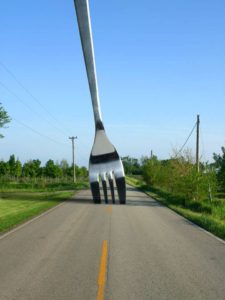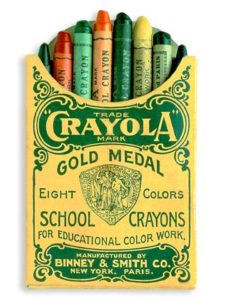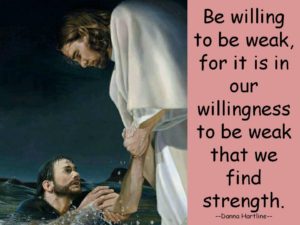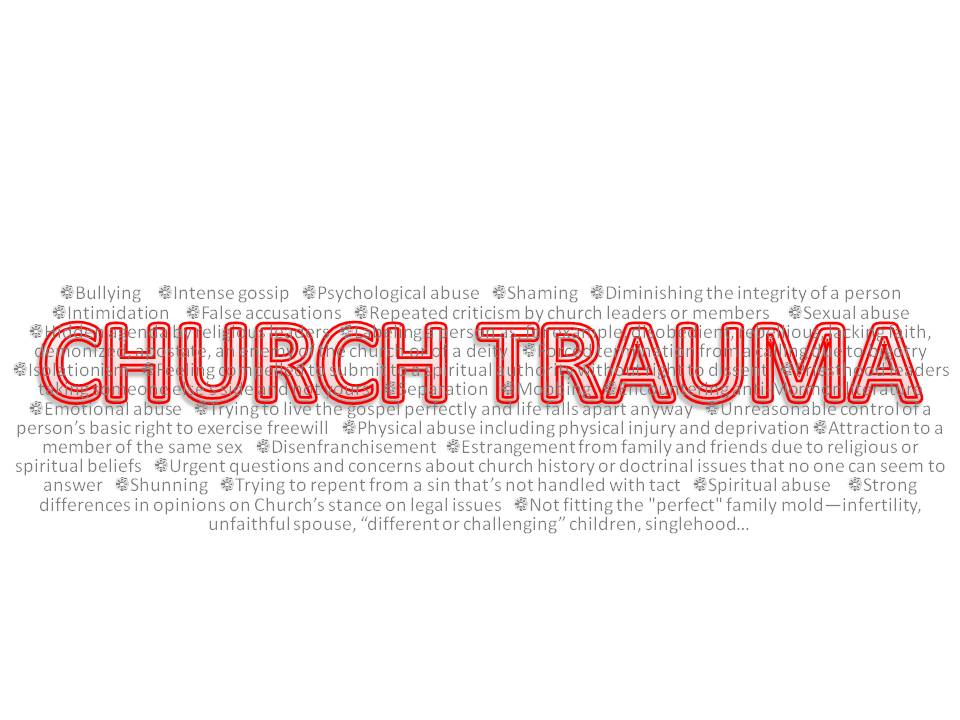Successful Navigation Might Require Us to Break the Rules Sometimes
I read a book once about how to drive through life successfully.  It had a lot of great points but I thought it was too simple-minded and rigid. Sometimes we are presented with situations that require hard, less popular answers and solutions. I want to address four principles that can help us get past these complex forks in the road so that we can continue successfully and faithfully navigating on the road of life:
It had a lot of great points but I thought it was too simple-minded and rigid. Sometimes we are presented with situations that require hard, less popular answers and solutions. I want to address four principles that can help us get past these complex forks in the road so that we can continue successfully and faithfully navigating on the road of life:
1. Sometimes We Have to Go Out of the Lines
Often we get the idea that while navigating through life, we must always stay in the lines. On the surface, this seems like a very good idea and crucial to good navigation. I agree actually. I think mostly we should try to stay in the lines. But life has thrown me out of the lines a few times so I’ve been forced to examine it from that location—could that be called “forced rebellion?” Haha. Regardless, while on the parameter, I’ve had to question a thing or two about common assumptions about life:
“Will staying in the lines ALWAYS get us where we want or are supposed to go? Are there not times when God commands us to go outside the lines or even places us there?” Examples come to mind: In the Book of Mormon, Nephi was commanded to kill Laban. Abraham was commanded to lie that Sarah was his sister. Mormons believe the early Saints were commanded to practice polygamy. Moses was commanded to lead the Children of Israel out of Egypt.
Sometimes I think we get stuck on the road of life because we can only see the possibilities within the lines—we feel we have to stay there but isn’t true revelation often times outside of the lines? -Outside our lines of thinking, timing, ways, thoughts, and  understandings? But we leave the beaten path because the Lord directs us to do so. We don’t always know what we are doing or where we are going, only that we feel very much commissioned by the Lord to do so. The Prophet Lehi led his family out of the lines into the wilderness. He didn’t have the resources he once had so he couldn’t keep doing the things he once had done. He was left to sort, to accept, to trip and get up again. Nothing was familiar to him and he received a lot of criticism. But in time, the Lord did indeed lead his family to the Promised Land because he trusted the Lord knew a better way than was found inside the lines of his own wisdom or all the lines that he’d even been shown or taught to follow.
understandings? But we leave the beaten path because the Lord directs us to do so. We don’t always know what we are doing or where we are going, only that we feel very much commissioned by the Lord to do so. The Prophet Lehi led his family out of the lines into the wilderness. He didn’t have the resources he once had so he couldn’t keep doing the things he once had done. He was left to sort, to accept, to trip and get up again. Nothing was familiar to him and he received a lot of criticism. But in time, the Lord did indeed lead his family to the Promised Land because he trusted the Lord knew a better way than was found inside the lines of his own wisdom or all the lines that he’d even been shown or taught to follow.
2. Sometimes Dilemmas Occur, Forcing Us Off the Road While We Wait for Assistance
I like to play card games with an elderly couple in my ward. I try to get over to their house at least once a month. Not long ago, while I was at their house we played a game called Mille Bornes, which is a driving game. While we were playing it, some principles about driving were drawn to my attention. There were times we simply could not play or move forward even when we really wanted to—we had an accident or a flat tire or we were out of gas. Sometimes speed limits were placed on us and we were required to follow the rules of the game. We had to keep trying, keep drawing until we were finally “gifted” the card we wanted. It was not that we weren’t trying to drive and move forward, it’s that we simply couldn’t until the right card was received. Isn’t life sometimes like that?
Let me apply this to a favorite story. There was a young girl named Stephanie who went to her Kindergarten registration. A teacher was sitting just outside the room with a box of crayons and several sheets of blank paper. The girl’s mother smiled confidently when Stephanie was asked to choose her favorite color and write her name. The mother, who was sitting across the hall, thought proudly, “She can write all the names in our  family!” But to her mother’s surprise, Stephanie just stood there. The teacher repeated the instructions, and again the child stood still, staring blankly at the box of crayons with her knees locked and her hands behind her back. In the sweet, patient voice that teachers use when they are beginning to feel slightly impatient, the teacher asked once more, “Stephanie, choose your favorite color, dear, and write your name on this piece of paper.” But still, Stephanie stood frozen. So the teacher kindly said, “That’s okay. We will help you learn to write your name when you come to school in the fall.” The mother was shocked at Stephanie’s behavior! On the way home she tried to ask Stephanie as nonchalantly as possible why she had not written her name. “I couldn’t,” Stephanie replied. “The teacher said to choose my favorite color, and there wasn’t a pink in the box!”
family!” But to her mother’s surprise, Stephanie just stood there. The teacher repeated the instructions, and again the child stood still, staring blankly at the box of crayons with her knees locked and her hands behind her back. In the sweet, patient voice that teachers use when they are beginning to feel slightly impatient, the teacher asked once more, “Stephanie, choose your favorite color, dear, and write your name on this piece of paper.” But still, Stephanie stood frozen. So the teacher kindly said, “That’s okay. We will help you learn to write your name when you come to school in the fall.” The mother was shocked at Stephanie’s behavior! On the way home she tried to ask Stephanie as nonchalantly as possible why she had not written her name. “I couldn’t,” Stephanie replied. “The teacher said to choose my favorite color, and there wasn’t a pink in the box!”
Aren’t there times when we look in our crayon box and the color we need simply is not there? We want pink but no matter how hard we look, pink is not in the box! Likewise, isn’t drawing cards in this Mille Bornes game we played like trying, hoping, waiting on the Lord, supplicating Him and needing His power—His healing—in order to move forward, knowing we don’t control the elements of heaven, He does? Are there not times when He says, “Stop,” even on the good things in life? For example, I imagine that Lehi had to step away from some really good things, things he really loved in order to follow the Lord into the wilderness. We know such was the case for some of his children. Sometimes are we not asked to likewise step away from some of the things we love? And what if God directs you to put things you love on hold for a time, maybe indefinitely? Like what if being asked to stay home for a season has required me to really let go of my passions and dreams for a time, to stop doing what I love, what I’ve always done?
Does God not sometimes impose commands—revelations—upon us making us hand-tied in moving forward? Too often I hear these things chalked up as excuses but if God commands, are we really making excuses?
My sister, Katie, once had a dilemma. She, her husband, and her five children lived in a small home. The children were packed into two small bedrooms. They felt hand-tied in their situation so she took the problem to  the Lord. In essence, she pled: “Will you please give me a pink crayon so we can move forward? Our home is too small for us.” The Lord told her, “Yes, a home will be given to you.” So as strange as that answer was—homes just aren’t given to people!—she and her husband started looking for this pink crayon but instead, a different crayon—maybe a brown one—was thrust into their hands—another child! No!! She was told a pink crayon would
the Lord. In essence, she pled: “Will you please give me a pink crayon so we can move forward? Our home is too small for us.” The Lord told her, “Yes, a home will be given to you.” So as strange as that answer was—homes just aren’t given to people!—she and her husband started looking for this pink crayon but instead, a different crayon—maybe a brown one—was thrust into their hands—another child! No!! She was told a pink crayon would  come—a bigger house—but now this!—a seeming road block. Was she not bound until He gifted her further? Yet, strange events occurred after that. It was through this child that my sister discovered she had stage four breast cancer, which caused the community to rally around her, raising enough money that a home was literally given to my sister and her family. But that crayon was actually the color of death. My sister lost her life but it was the tender crayon the Lord handed my sister in response to her plea.
come—a bigger house—but now this!—a seeming road block. Was she not bound until He gifted her further? Yet, strange events occurred after that. It was through this child that my sister discovered she had stage four breast cancer, which caused the community to rally around her, raising enough money that a home was literally given to my sister and her family. But that crayon was actually the color of death. My sister lost her life but it was the tender crayon the Lord handed my sister in response to her plea.
3. Sometimes It Is Okay to Go in Reverse
 Let’s think about the important driving rule to move forward on the road—do not put the car in reverse on the highway! Remember Lot’s wife—don’t go back!
Let’s think about the important driving rule to move forward on the road—do not put the car in reverse on the highway! Remember Lot’s wife—don’t go back!
But maybe we do need to be turned into a pillar of salt on occasion (but hopefully not again and again) in order to be rebuilt… Maybe we need a refresher course on reading or piano or algebra if we are getting tripped up by lessons that are too advanced… Maybe we have been speeding along so quickly that we have lost important parts of the car that we need to back track to pick up, examine the damage, and reconstruct it so that it can be reassembled properly in the car. Sometimes putting the car in reverse is a very good idea. It may ruffle many drivers who are trying to move forward, but if you ignore the needs of you own vehicle, you will never truly be able to get anywhere far. Going in reverse will probably require you to go out of the lines as well, otherwise you will cause a great number of accidents.
4. Sometimes We Have to Service Our Vehicles
Take a minute and ponder the combination of these verses here:
“Remember Lot’s wife.
“Whosoever shall seek to save his life shall lose it, and whosoever shall lose his life shall preserve it” (Luke 17:32-33).
Lot’s wife lost her life because she looked back. We know that. The scripture directly following it is usually used to explain our need to serve, to lose ourselves in service, but is that taken out of context? There seems to be a connection to Lot’s wife since it directly follows. What could it be?
Lot’s wife was seeking to save her old life. She did not want to go outside of the lines of her old life—she wanted to stay there. Consequently, she lost her life. Yet, if she would have trusted that by leaving her familiar path behind, even though it did not make sense, she would actually have found she had been saved by such an act. In this context, she was not asked to forget about herself in order to find herself through service, but to consider the value of her life—the importance of preserving herself—her mental, spiritual, and emotional health—and to have the courage to walk away from a place that would not work out or help her long-term. It was not leading her to where she needed to go. Perhaps that is how we truly save our lives: by considering our spiritual, emotional, and mental needs—not  others—first—not last, to put our needs for God above our need for carnal security, for worldly nods of approval. This is called self-care.
others—first—not last, to put our needs for God above our need for carnal security, for worldly nods of approval. This is called self-care.
Sometimes in our serving others, we actually do not put ourselves where we need to. Sometimes we try so hard to lose ourselves in service—to be “good” by staying inside the lines—that we neglect our own needs, unwittingly and to our complete confusion; and as a result, we turn into a pillar of salt. We do not recognize the danger of vehicle exhaustion, but rather think that is how we are supposed to run our engines so that we will eventually preserve our cars. But all we really do when we neglect ourselves is bust our engines, leaving it dead in the middle of the road—between the lines—only to be rammed, abused, and scoffed at. Soon we are nothing but a pillar of debris on the busy, heartless highway of life. We have to be carefully swept up and relocated, lest we continue to do further damage to those trying to drive between the lines.
My Final Plea
Each of us must be careful in our navigation—in following the beaten path. Maybe sometimes the answer is not to stay in the car at all but to get out of the car for a season. Examine it for a moment from the outside. Repair it. Do what is needed so that you can move forward for the duration. This might require much out-of-the-lines thinking but with the Lord’s help, each of us can safely arrive at our desired locations. Life is not simplistic or black and white. God is mysterious and His ways are beyond our comprehension and often beyond our ways of even considering. Yet, God lives and can be trusted! With faith in Him, we can courageously follow His personalized directives for our life’s course!




9 Comments
Jeri
Very good points! Thank you.
Mick
YES!! Just what I was needing…
Amelia K.
I love this!
Darren
This makes total sense! Well written and thoughtful!
Tom Irvine
“Learn and obey the rules very well so you will know how to break them properly.”
― Dalai Lama XIV
Lynda Seele
Love the out of the box thinking … so true that often times the “rules” don’t work for us … and who made the dumb rules anyway?
Marianne Kerry
Your words hit home. Have you been reading my journal??!
Patrick Hennessy
If we all acted in the same way…how many of us are truly needed.
Tom Irvine
Jesus was often accused of breaking rules by the Pharisees. But these were really the “commandments of men” from the Oral Torah. But he also broke a fundamental rule of his earthly mission as set forth by Heavenly Father. Yes, this story can be interpreted many ways. But to me its shows that there is a time for exceptions…
Matthew 15
21 Then Jesus went thence, and departed into the coasts of Tyre and Sidon.
22 And, behold, a woman of Canaan came out of the same coasts, and cried unto him, saying, Have mercy on me, O Lord, thou son of David; my daughter is grievously vexed with a devil.
23 But he answered her not a word. And his disciples came and besought him, saying, Send her away; for she crieth after us.
24 But he answered and said, I am not sent but unto the lost sheep of the house of Israel.
25 Then came she and worshipped him, saying, Lord, help me.
26 But he answered and said, It is not meet to take the children’s bread, and to cast it to dogs.
27 And she said, Truth, Lord: yet the dogs eat of the crumbs which fall from their masters’ table.
28 Then Jesus answered and said unto her, O woman, great is thy faith: be it unto thee even as thou wilt. And her daughter was made whole from that very hour.